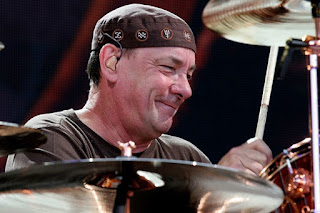That’s right, I said it. Bruce Springsteen, blue-collar hero of meat and potatoes rock and roll, comes up with one of his most beloved songs, featuring multiple distinct sections, abrupt tempo shifts, long instrumental passages, unexpected modulations and an overtly melodramatic storyline. In other words, prog.
Oh, sure, it wouldn’t seem to have a lot in common with ELP or King Crimson, musically. And lyrically it’s got nothing in common with Yes since the lyrics are, you know, comprehensible. ("Mountains come out of the sky and they stand there" — and that ain't cherrypicking, that's from their most popular song.)
But it’s not far off from what Genesis was doing its last few years with Peter Gabriel—in fact, given the radically different backgrounds of its creators, it really is like the American cousin of Selling England by the Pound’s “Battle of Epping Forest.”
Both take scenarios thoroughly steeped in their own local mythologies—Robin Hood’s old stomping grounds as a setting for a gang war versus the New Jersey Turnpike and a more mundane urban street scene—and craft a relatively straightforward narrative around them, both shot through with violence and ending in death. (SPOILERS!)
There are more than a few differences, of course: for one thing, Peter Gabriel’s lyrics play up the absurdity for comedic effect, and the variety of voices he utilizes only emphasizes that. Springsteen, in contrast, is aiming for high tragedy, complete with heartbreaking catharsis.
But even the names—the Magic Rat and the Maximum Lawman, Liquid Len and Bob the Nob—are of a piece. Both feature slower, softer instrumental intros which burst into uptempo rock and roll. (Well…something kind of approaching some sort of rock and rollian, rock and rollesque approximation, in the case of Genesis.) Both feature prominent keyboard parts as the dominant instrument overall, but “Jungleland” makes outstanding use of Clarence Clemons’ saxophone for its long, arduously composed and recorded solo, the most memorable part of the song—no small feat, given the gorgeous piano and violin intro, or the fine guitar solo, whereas ace Genesis guitarist Steve Hackett was, as all too often, relegated to textures (at which he was exceptional) and mixed too low.
And coincidence that the only time Springsteen released a song like this was in 1975, during the height of prog, when it was pretty much the most popular genre going at the time? And he wouldn’t do anything even remotely approaching it for 35 more years? Nay, I say—I say thee nay.
Which isn’t to say "Jungleland"'s not great, of course. ‘cuz it is, and I say that as someone who admits he’s got a fondness for prog. In fact, one of the big differences between the two songs is their relative quality: "Jungleland" succeeds in everything it tries to do, whereas "Epping Forest" is, as almost all the musicians involved admit, more than a bit of a mess: musically overly busy, even by prog standards, and massively overstuffed lyrically; comparing it to the same albums "Cinema Show" or "Dancing with the Moonlit Knight" make clear how powerful these ingredients can be when mixed in the proper proportions...which they aren't here.
“Jungleland” is epic and sprawling and gorgeous and ambitious and moving and sums up the entire Born to Run album perfectly. It’s the last gasp of a tenacious young kid willing, happy, desperate to try anything, to toss the kitchen sink and anything else he can find into the pot, hoping to discover the ideal medium for his message. He’d find it when recording his next album, and things would pretty much forever be far more stripped down and direct. So enjoy this last gasp of Bruce Springsteen figuring out who he is. Once he figures that out for sure, things might get even better, maybe, but there’s nothing quite like the rush of a young artist exploding into full promise.





